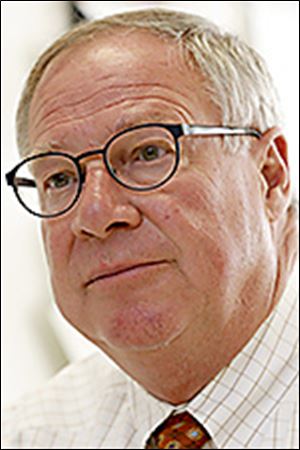
EDITORIAL
Smokeless
Mayor Collins’ proposed ban on hiring tobacco users needs to be refined, but the principle merits support
7/2/2014
Collins
Toledo Mayor D. Michael Collins wants to deny jobs in city government to applicants who use tobacco. That raises big practical and policy questions, some of which the administration appears not to have thought all the way through. Still, the mayor’s concept is a sincere and praiseworthy effort that can improve public health while it limits taxpayers’ share of municipal health-care costs.
Mr. Collins discussed his proposal last week in a meeting with Blade editors and reporters, and went public with it this week. Under his plan, the city would refuse to hire people who smoke or ingest tobacco in other forms; prospective employees would be screened for nicotine use. The administrative policy, which he intends to introduce this month, would not require the approval of City Council.
The policy would not apply to current workers, although the mayor says city employees who use tobacco can expect to pay a higher share of their health-insurance costs. At the same time, he says city government will expand its stop-smoking programs for employees — a praiseworthy and cost-effective effort.
Mayor Collins, who says he once smoked a pipe, insists that his proposed policy is legal. He notes that major private employers in Ohio such as ProMedica, Hollywood Casino Toledo, and Cleveland Clinic don’t hire smokers (The Blade does not have such a policy).
Yet public employers are subject to different considerations. Tobacco users are not a legally protected class. Even before the mayor’s policy takes effect, though, it is attracting opposition from “smokers’ rights” advocates who claim it amounts to job discrimination against adults who pursue a legal activity. Challenges to the policy seem inevitable.
Warnings that a refusal to hire smokers would deprive city government of a substantial source of talent seem overblown. Assertions that this matter is none of the mayor’s business — that he should limit himself to filling potholes and picking up the trash — are equally myopic.
More valid are concerns that the city is placing itself on a slippery slope: Will it next rule out hiring people who are overweight, or drink alcohol, or choose to engage in other private conduct that may not be healthy but is lawful? Where do you draw the line?
Yet smoking, the leading cause of preventable death, has public as well as private costs in Ohio. The American Lung Association in Ohio says these costs include an estimated $9 billion a year in health-care expenses, nearly 19,000 deaths, and economic productivity lost to workplace absences, all related to tobacco use.
Almost one-fourth of Ohio adults smoke. So do more than one-fifth of high school students. Such things are very much valid topics of municipal policy.
Mayor Collins disdains suggestions that critics nationwide will portray him as the poster child of the nanny state. He insists he is interested only in pursuing good public policy, and adds: “I’m not looking for popularity.”
But if he can refine his new anti-tobacco policy in ways that address legitimate objections and challenges, it can become a model for local governments across the nation. That would be a distinction Toledo could claim proudly.